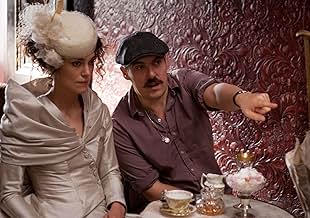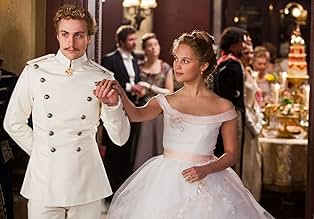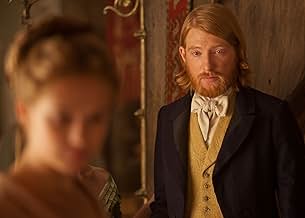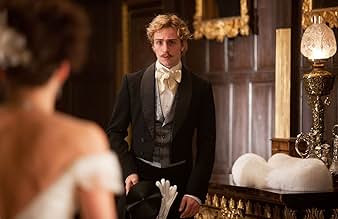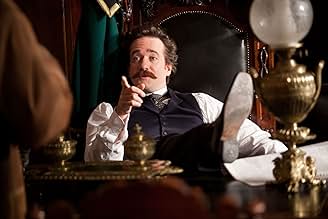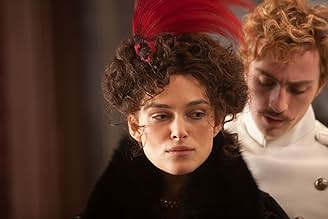In der russischen High Society des ausgehenden 19. Jahrhunderts beginnt die Petersburger Adelige Anna Karenina eine lebensverändernde Affäre mit dem schneidigen Graf Alexei Vronsky.In der russischen High Society des ausgehenden 19. Jahrhunderts beginnt die Petersburger Adelige Anna Karenina eine lebensverändernde Affäre mit dem schneidigen Graf Alexei Vronsky.In der russischen High Society des ausgehenden 19. Jahrhunderts beginnt die Petersburger Adelige Anna Karenina eine lebensverändernde Affäre mit dem schneidigen Graf Alexei Vronsky.
- Regie
- Drehbuch
- Hauptbesetzung
- 1 Oscar gewonnen
- 33 Gewinne & 54 Nominierungen insgesamt
Empfohlene Bewertungen
If your prime reaction to a film is one of disappointment there are usually some good reasons. My principal response to this version of a great and well-known story is one of irritation. The overblown theatrical format of the film gets in the way of character and dramatic development, to the point where you're aware of a director proclaiming "aren't we clever with the way we're staging this?" instead of admiring the straightforward and competent telling of a story. I'm not saying all films have to be constructed in a conventional manner, but when the form overtakes the substance something has gone wrong.
Aaron Taylor-Johnson as Count Vronsky is a piece of serious miscasting. Instead of looking like a great lover and sure temptation for wavering Anna,he looks like some feeble dandy with his foppish shock of dyed curly blonde hair which makes him look quite ridiculous. How on earth Anna could fall for such a creepy-looking guy is beyond most viewers I would submit.
Keira Knightley does the best she can, despite looking most of the time like she's attending a fashion shoot. The character of Anna requires portrayal of a tragic life which she doesn't quite achieve. However, the whole film fails to convey the grandeur of Tolstoy's vision, so she's let off the hook by the film's general levity and lack of substance.
Aaron Taylor-Johnson as Count Vronsky is a piece of serious miscasting. Instead of looking like a great lover and sure temptation for wavering Anna,he looks like some feeble dandy with his foppish shock of dyed curly blonde hair which makes him look quite ridiculous. How on earth Anna could fall for such a creepy-looking guy is beyond most viewers I would submit.
Keira Knightley does the best she can, despite looking most of the time like she's attending a fashion shoot. The character of Anna requires portrayal of a tragic life which she doesn't quite achieve. However, the whole film fails to convey the grandeur of Tolstoy's vision, so she's let off the hook by the film's general levity and lack of substance.
Remember that scene early in Inception where Leonardo di Caprio and Ellen Page are sitting at a sidewalk cafe as he explains how his dream technology works? He points out that in a dream you never question the time, place, or circumstances in which you find yourself, you just accept them as normal. Suddenly windows start exploding, pavement buckles, the streets of Paris start curving over their heads, and you realize that the entire sequence has played out just the way he described it. You, sitting in the audience, never questioned how they got to that cafe in the 1st place, you just took it for granted.
The reason Christopher Nolan was able to pull this off so deftly was that we bring the same short-cut sensibility with us to the movies. We see a person in an office, a taxi, a restaurant, and an apartment in quick succession but don't want to be bored with the tedium of actually getting from one of those locales to the next, so we gladly accept the cinematic convention of just jump-cutting from scene to scene.
The most recent (of many) productions of Anna Karenina, Leo Tolstoy's classic novel of a high-society scandal in doomed imperial Russia circa 1890, reveals some of this artifice to the inquisitive eye. Much of the film appears to be set on an actual theater stage, but characters walk on and off that stage to what appears to be the real world — or saunter backstage to have it turn into a train station. Much of it is stilted and artificial — such as all the other dancers freezing in position during the Platonic ideal of a ballroom waltz (with heavy swing-dance styling), as Anna and Vronsky swirl among them. The extent of privilege of the Russian noble classes is underlined by the way in which the various counts and dukes just casually hold out a hand, expecting out of habit that a drink or the next piece of paperwork will be instantly placed there by an obsequious lackey, or holding out an arm while doing a 360, never questioning that the office suit coat will be removed by the left-hand lackey while the evening jacket is being simultaneously slipped on by the right-hand one. And director Joe Wright cuts the audience no expositional slack whatsoever in introducing the characters or keeping their various nicknames straight (and Russians have lots of nicknames); you just have to pick up who's who on your own.
The costuming is sumptuous and seems a lock for this year's Oscar in that category. However, I was bemused that, shortly after leaving the Sundance Theater, I swung by the Middleton Marriott to drop off some fliers at TeslaCon, a steampunk immersion convention, and found myself walking into the kind of artificial environment Wright had created, with congoers all self-costumed nearly as well as the best Hollywood could produce.
All of this style and metapresentation comes at a price, however, and the price is the humanity of the characters. Due to the mode of presentation, we can never suspend our disbelief long enuf to start thinking of them as real people; they remain actors in a play, and we're never allowed to forget it.
Keira Knightley is radiant as Anna, and Jude Law is agonizingly prim, principled, and earnest as Karenin (and we can't help but feel serious empathy for him, despite learning that his parliamentary maneuverings represent the worst form of bigotry), but I was disappointed in Aaron Taylor-Johnson as Vronsky. He seemed too effete and foppish and not nearly dashing enuf to win Anna's heart at first glance. But then, as he remarked, "you can't ask why about love."
This version of AK will certainly be remembered more for its staging than for its story. Perhaps that's excusable, since the story has been told so many times before, and often well and beautifully, but it's a shame that we were reduced to thinking of it as a necessary nuisance getting in the way of the stagecraft.
The reason Christopher Nolan was able to pull this off so deftly was that we bring the same short-cut sensibility with us to the movies. We see a person in an office, a taxi, a restaurant, and an apartment in quick succession but don't want to be bored with the tedium of actually getting from one of those locales to the next, so we gladly accept the cinematic convention of just jump-cutting from scene to scene.
The most recent (of many) productions of Anna Karenina, Leo Tolstoy's classic novel of a high-society scandal in doomed imperial Russia circa 1890, reveals some of this artifice to the inquisitive eye. Much of the film appears to be set on an actual theater stage, but characters walk on and off that stage to what appears to be the real world — or saunter backstage to have it turn into a train station. Much of it is stilted and artificial — such as all the other dancers freezing in position during the Platonic ideal of a ballroom waltz (with heavy swing-dance styling), as Anna and Vronsky swirl among them. The extent of privilege of the Russian noble classes is underlined by the way in which the various counts and dukes just casually hold out a hand, expecting out of habit that a drink or the next piece of paperwork will be instantly placed there by an obsequious lackey, or holding out an arm while doing a 360, never questioning that the office suit coat will be removed by the left-hand lackey while the evening jacket is being simultaneously slipped on by the right-hand one. And director Joe Wright cuts the audience no expositional slack whatsoever in introducing the characters or keeping their various nicknames straight (and Russians have lots of nicknames); you just have to pick up who's who on your own.
The costuming is sumptuous and seems a lock for this year's Oscar in that category. However, I was bemused that, shortly after leaving the Sundance Theater, I swung by the Middleton Marriott to drop off some fliers at TeslaCon, a steampunk immersion convention, and found myself walking into the kind of artificial environment Wright had created, with congoers all self-costumed nearly as well as the best Hollywood could produce.
All of this style and metapresentation comes at a price, however, and the price is the humanity of the characters. Due to the mode of presentation, we can never suspend our disbelief long enuf to start thinking of them as real people; they remain actors in a play, and we're never allowed to forget it.
Keira Knightley is radiant as Anna, and Jude Law is agonizingly prim, principled, and earnest as Karenin (and we can't help but feel serious empathy for him, despite learning that his parliamentary maneuverings represent the worst form of bigotry), but I was disappointed in Aaron Taylor-Johnson as Vronsky. He seemed too effete and foppish and not nearly dashing enuf to win Anna's heart at first glance. But then, as he remarked, "you can't ask why about love."
This version of AK will certainly be remembered more for its staging than for its story. Perhaps that's excusable, since the story has been told so many times before, and often well and beautifully, but it's a shame that we were reduced to thinking of it as a necessary nuisance getting in the way of the stagecraft.
It took me about an hour to stop being irritated by the movie's self consciousness, to sort of enjoy it... but the damage was done.
As viewers, we have no reason to believe in the love Anna finds. He is creepy and give us no inkling of why she might ruin her life for him.
Kiera isn't bad, just annoying, considering we have no empathy for her self indulgence. If her husband was worse, her love a lot nicer, and if we could feel electricity between them, it would be a different matter, but the fact is the movie is too busy being clever... it misses out on having a heart and soul.
The theatre gimmick got in the way, and seemed like a cheap way of having Moscow backdrops without actually traveling there.
5/10
As viewers, we have no reason to believe in the love Anna finds. He is creepy and give us no inkling of why she might ruin her life for him.
Kiera isn't bad, just annoying, considering we have no empathy for her self indulgence. If her husband was worse, her love a lot nicer, and if we could feel electricity between them, it would be a different matter, but the fact is the movie is too busy being clever... it misses out on having a heart and soul.
The theatre gimmick got in the way, and seemed like a cheap way of having Moscow backdrops without actually traveling there.
5/10
The staging of this film is certainly something I hadn't seen before. The majority of scenes are made to look like everything is happening on a theater stage. This style doesn't add a whole lot to the film though. While the costumes, production design, music, and cinematography are all terrific, I'm afraid I can't say the same about the story. It just didn't really capture me and I found a lot of the film to be boring. Anna Karenina may be a classic text, but I can't use the same adjective for this retelling.
Good production but doesn't quite hit the spot.
Set in 19th century Russia, a married aristocrat, Anna Karenina (played by Keira Knightley), starts an affair with a Count. After a while, the relationship becomes quite serious...
A decent adaptation of the Tolstoy novel. Lavish costumes and sets, and a sense of the emptiness and superficiality of Russian aristocracy. However, for all its intrigues, just doesn't quite hit the spot. Not entirely engaging and seems to drag in segments. Some of the imagery was just to clever for its own good, ending up feeling pretentious.
Solid performances all round. Jude Law is the best of the lot, as the conservative husband of Anna Karenina.
Set in 19th century Russia, a married aristocrat, Anna Karenina (played by Keira Knightley), starts an affair with a Count. After a while, the relationship becomes quite serious...
A decent adaptation of the Tolstoy novel. Lavish costumes and sets, and a sense of the emptiness and superficiality of Russian aristocracy. However, for all its intrigues, just doesn't quite hit the spot. Not entirely engaging and seems to drag in segments. Some of the imagery was just to clever for its own good, ending up feeling pretentious.
Solid performances all round. Jude Law is the best of the lot, as the conservative husband of Anna Karenina.
Wusstest du schon
- WissenswertesOne of Alicia Vikander's favorite experiences from the production was the filming that took place in the countryside outside of St. Petersburg, Russia. The temperatures dropped below -40 °C, and she stayed in a cabin for five days that didn't have hot water and only featured benches instead of beds. Meanwhile, Russian security guards protected her and co-star 'Domhnall Gleeson' from wild wolves and bears that dominated the deserted area.
- PatzerThe label of the bottle of morphine Anna drinks from changes from "la Morphine" to "Morphine" between shots. The only correct French form would be without an article (prescriptions would have been written in Latin in 19th-century Russia anyway).
- VerbindungenFeatured in Projector: Anna Karenina (2012)
- SoundtracksSong for a New Life (Masha's Song)
(uncredited)
Written by Anoushka Shankar
Performed by Tannishtha Chatterjee
Top-Auswahl
Melde dich zum Bewerten an und greife auf die Watchlist für personalisierte Empfehlungen zu.
- How long is Anna Karenina?Powered by Alexa
Details
- Erscheinungsdatum
- Herkunftsländer
- Offizieller Standort
- Sprache
- Auch bekannt als
- Chuyện Tình Anna
- Drehorte
- Kizhi, Karelia, Russland(on location)
- Produktionsfirmen
- Weitere beteiligte Unternehmen bei IMDbPro anzeigen
Box Office
- Budget
- 40.600.000 $ (geschätzt)
- Bruttoertrag in den USA und Kanada
- 12.816.367 $
- Eröffnungswochenende in den USA und in Kanada
- 320.690 $
- 18. Nov. 2012
- Weltweiter Bruttoertrag
- 68.929.150 $
- Laufzeit
- 2 Std. 9 Min.(129 min)
- Farbe
- Sound-Mix
- Seitenverhältnis
- 2.35 : 1
Zu dieser Seite beitragen
Bearbeitung vorschlagen oder fehlenden Inhalt hinzufügen







